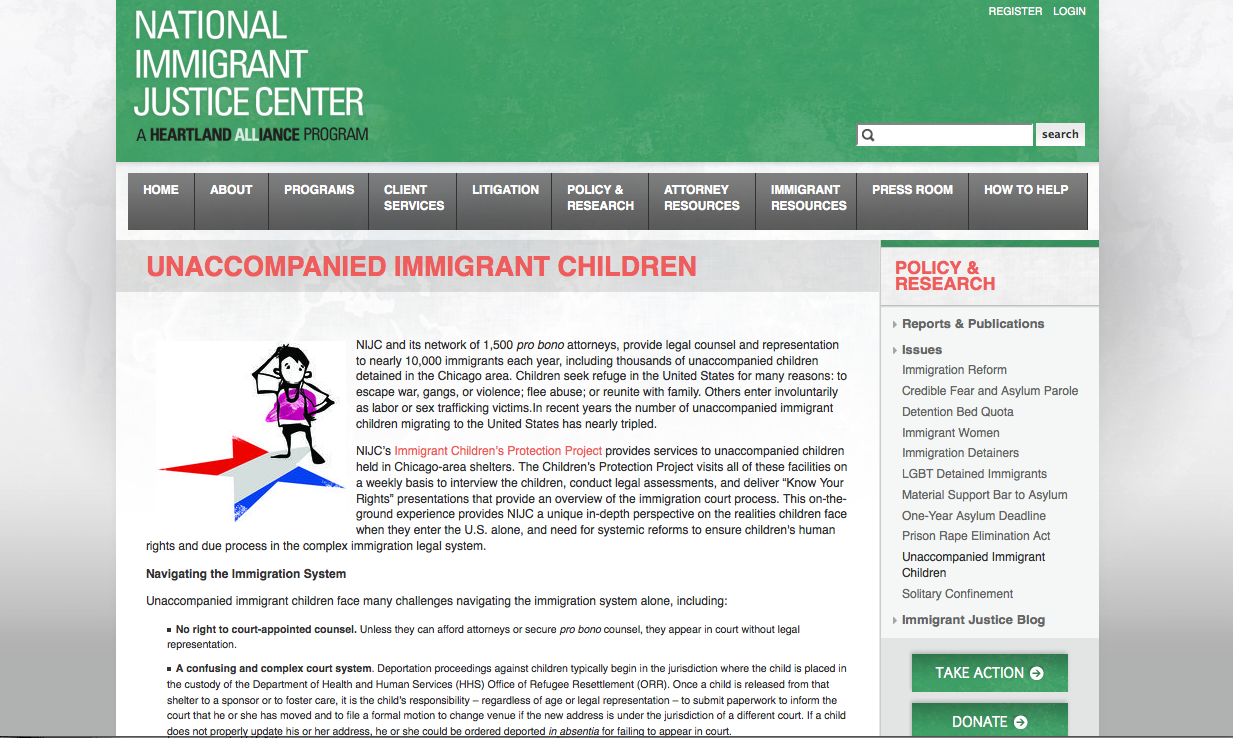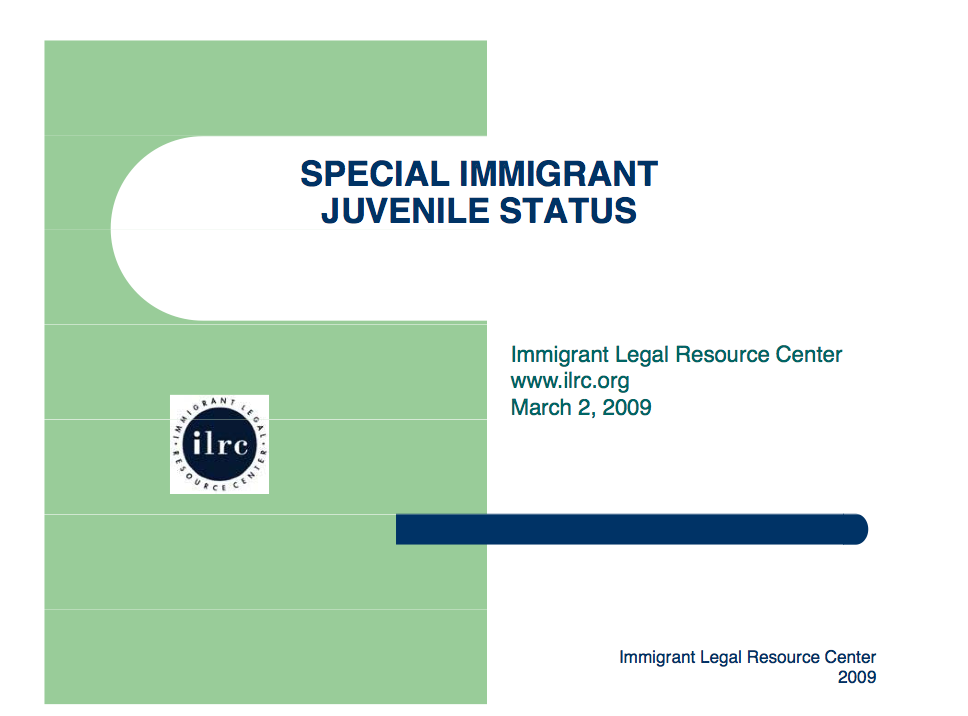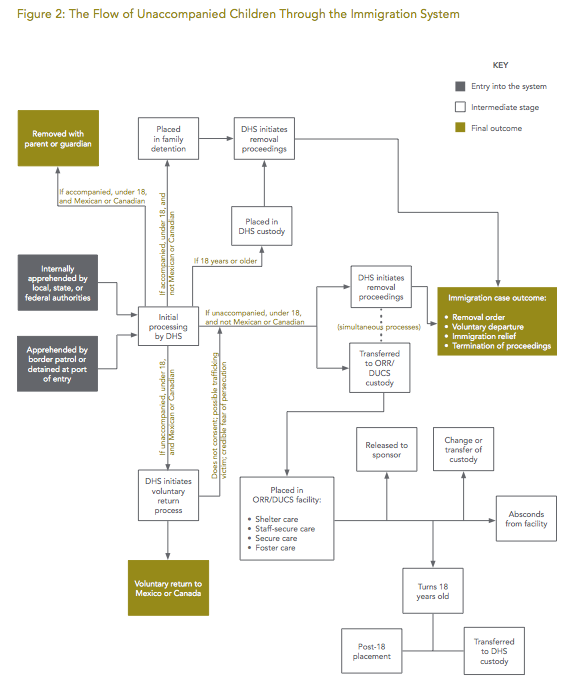via Unaccompanied Immigrant Children | National Immigrant Justice Center.
NIJC and its network of 1,500 pro bono attorneys, provide legal counsel and representation to nearly 10,000 immigrants each year, including thousands of unaccompanied children detained in the Chicago area. Children seek refuge in the United States for many reasons: to escape war, gangs, or violence; flee abuse; or reunite with family. Others enter involuntarily as labor or sex trafficking victims.In recent years the number of unaccompanied immigrant children migrating to the United States has nearly tripled.
NIJC’s Immigrant Children’s Protection Project provides services to unaccompanied children held in Chicago-area shelters. The Children’s Protection Project visits all of these facilities on a weekly basis to interview the children, conduct legal assessments, and deliver “Know Your Rights” presentations that provide an overview of the immigration court process. This on-the-ground experience provides NIJC a unique in-depth perspective on the realities children face when they enter the U.S. alone, and need for systemic reforms to ensure children’s human rights and due process in the complex immigration legal system.
Navigating the Immigration System
Unaccompanied immigrant children face many challenges navigating the immigration system alone, including:
- No right to court-appointed counsel. Unless they can afford attorneys or secure pro bono counsel, they appear in court without legal representation.
- A confusing and complex court system. Deportation proceedings against children typically begin in the jurisdiction where the child is placed in the custody of the Department of Health and Human Services (HHS) Office of Refugee Resettlement (ORR). Once a child is released from that shelter to a sponsor or to foster care, it is the child’s responsibility – regardless of age or legal representation – to submit paperwork to inform the court that he or she has moved and to file a formal motion to change venue if the new address is under the jurisdiction of a different court. If a child does not properly update his or her address, he or she could be ordered deported in absentia for failing to appear in court.
- Lack of clear guidelines to grant relief. DHS has yet to provide clear guidelines on the exercise of prosecutorial discretion (PD) as it applies to UICs. Expanded exercise of PD would help provide relief for many UICs with strong ties to the United States who are not a priority for deportation.
- Absence of legally binding regulations to protect children in DHS custody. Upon apprehension, UICs are held in DHS custody. Although there are standards to guide the treatment of UICs, DHS lacks appropriate legally binding regulations to protect children in their custody. Currently, little oversight exists to ensure that UICs are treated humanely and cared for according to child-appropriate protocols while in DHS custody.
Click here to learn more about these challenges in NIJC’s policy brief.
Policy Recommendations
Regardless of their immigration status, unaccompanied immigrant children should be treated as children first. Children should not be expected to navigate a complex immigration system alone. Congress and the Obama Administration must take steps to provide critical safeguards to unaccompanied children who, all too often, are navigating the U.S. immigration system alone, including:
- Providing counsel to unaccompanied children. Children face insurmountable challenges and experience a denial of due process when navigating the U.S. immigration system without attorneys. Access to legal representation is critical for children to be able to understand the legal protection and immigration benefits that may be available.
- Increasing funding for legal orientation programs (LOPs) at ORR shelters and legal orientation programs for custodians (LOPCs) when children are released. As unaccompanied children move more rapidly through the ORR system, the government must ensure that children receive basic information about their rights and responsibilities, and individualized legal assessments to understand whether they might be eligible for immigration relief. Once they are released, their family or sponsors must also have access to information about the immigration system so they can properly assist the children during the immigration process.
- Enact protocols to end abusive treatment at the border. NIJC’s survey and mass complaint on behalf of 116 unaccompanied children abused in CBP custody demonstrate that unaccompanied children often are held in extreme temperatures, prevented from sleeping, provided with little food and placed in shackles by DHS officers at the border. DHS must develop legally binding regulations and oversight mechanisms, in collaboration with nongovernmental organizations who serve this population, to ensure officers treat children humanely.
- Passing comprehensive immigration reform legislation so families can legally and safely reunify. Undocumented family members in the United States need a mechanism to safely and legally reunite with their children. Immigration reform must include provisions that allow parents to obtain lawful immigration status and petition for their children and other family members.
Resources
Frequently asked questions (FAQs) on unaccompanied children (July 2014)
Press Call: Fact & Fiction: Understanding the Legal Rights of Central American Children in the U.S. (July 2014)
Speakers: Mary Meg McCarthy, NIJC Executive Director; Lisa Koop, NIJC Associate Director of Legal Services; and Royce Murray, NIJC Director of Policy
Fact sheet: The Refugee Crisis at the U.S. Border (June 2014)
NIJC’s mass complaint to DHS on behalf of 116 unaccompanied children (June 2014)
- Press teleconference on the complaint (June 11, 2014)
NIJC’s policy brief on unaccompanied immigrant children (January 2014)
NIJC’s Executive Director Mary Meg McCarthy’s Letter to the Editor in the Wall Street Journal (February 2014)
Reports
United Nations High Commissioner for Refugees (UNHCR), Findings and Recommendations Relating to the 2012-2013 Missions to Monitor the Protection Screening of Mexican Unaccompanied Children Along the U.S.-Mexico Border, June 2014
Center for Comparitive Immigration Studies, Statistical Analysis Shows that Violence, Not U.S. Immigration Policies, is Behind the Surge of Unaccompanied Children Crossing the Border, July 2014
American Immigration Council, Children in Danger: A Guide to the Humanitarian Challenge at the Border, July 2014
American Immigration Council, No Childhood Here: Why Central American Children are Fleeing Their Homes, July 2014
Center for Gender & Refugee Studies (CGRS) and Kids in Need of Defense (KIND), A Treacherous Journey: Child Migrants Navigating the U.S. Immigration System, March 2014
UNHCR, Children on the Run: Unaccompanied Children Leaving Central America and Mexico and the Need for International Protection, March 2014
U.S. Conference of Catholic Bishops (USCCB), The Changing Face of the Unaccompanied Alien Child: A Portrait of Foreign-Born Children in Federal Foster Care and How to Best Meet Their Needs, December 2012
Vera Institute of Justice, The Flow of Unaccompanied Children Through the Immigration System: A Resource for Practitioners, Policy Makers, and Researchers, March 2012
Appleseed, Children at the Border: The Screening, Protection and Repatriation of Unaccompanied Mexican Minors, 2011
NIJC Congressional Testimony
Senate Appropriations Hearing on the White House Emergency Supplemental Funding Request (July 2014)
House Judiciary hearing on unaccompanied immigrant children (June 2014)
NGO Advocacy Letters
Letter from 191 NGOs to the Senate and House on supplemental funding for the refugee situation at the Southern border (July 2014)
Letter from 300+ faith groups urging the president and Congress to protect unaccompanied children (July 2014)
Letter from the National Association of Immigration Judges (NAIJ) to the Senate and House on ensuring fairness for children in immigration courts (July 2014)
Letter from NGOs to the Senate Appropriations Committee on legal counsel for unaccompanied children (July 2014)
Letter from Alianza Latina en contra la Agresión Sexual (ALAS) NGO members to President Obama (July 2014)
Letter from NGOs to President Obama against the expedited removal of unaccompanied children (July 2014)
NIJC’s letter to DHS and HHS with policy recommendations for unaccompanied children (April 2014)



